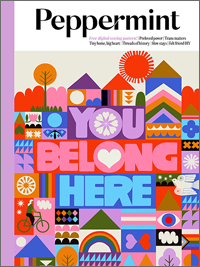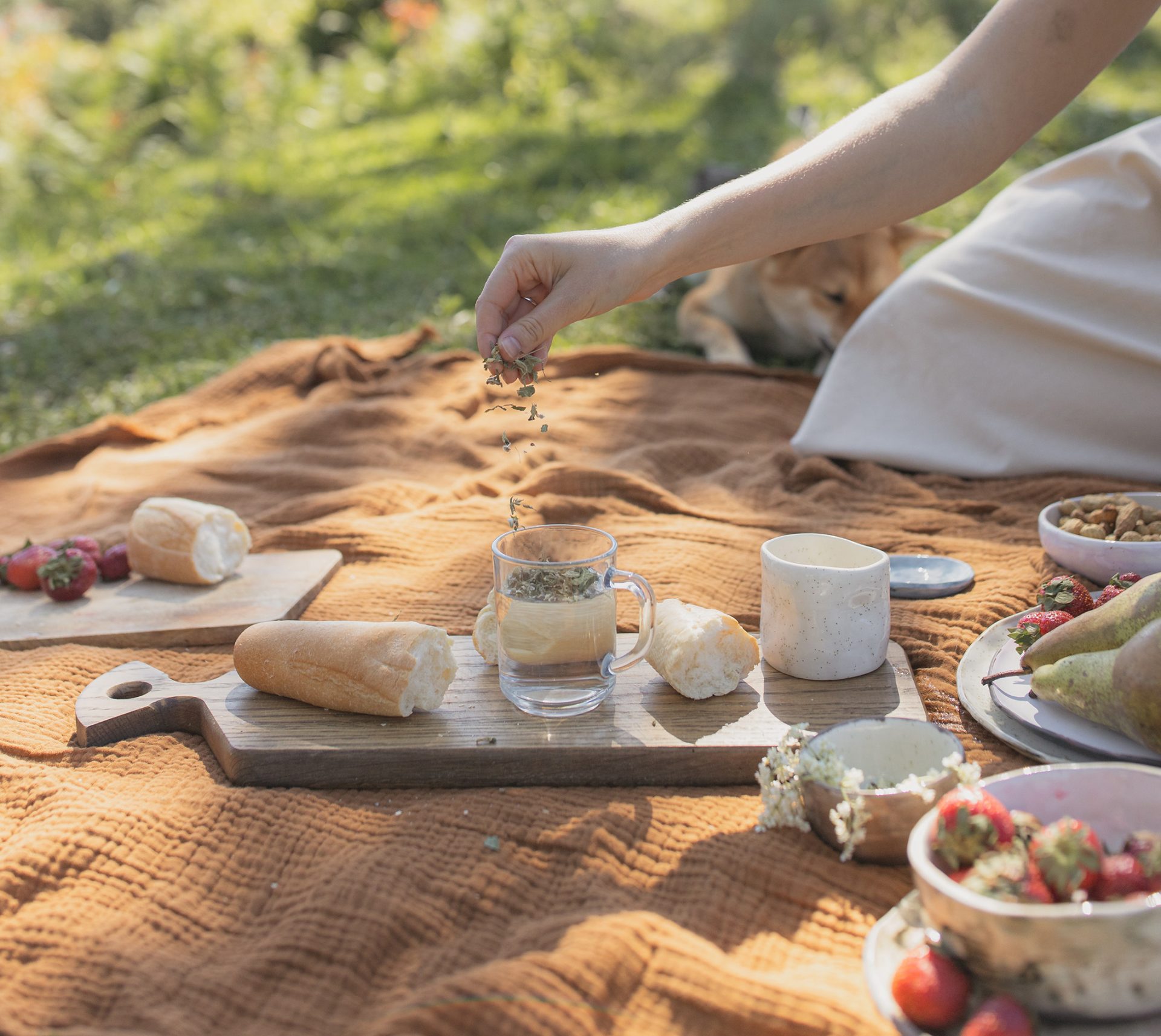
Joy to the World: It’s the Peppermint Christmas Kindness Challenge
It’s that time of year again. The car parks are full, the store shelves are being emptied and after the whirlwind that was 2020, we are keen to celebrate with those we love the most. A consistent message we’ve communicated this year is the importance of kindness (have you nominated someone in our latest initiative The Kindness Cup yet?) so we teamed up with Katie Roberts, chief eco expert from Sustainability In Style, to create a Christmas Kindness Challenge in the lead-up to holiday celebrations.
Over the next week (and a bit) we’ll update this page with prompts for mindful reflection for a not-so-silly season. Share your thoughts with us on socials (#PeppermintChristmasChallenge) and help spread a little peace, calm and unity as the year closes. Happy holidays!
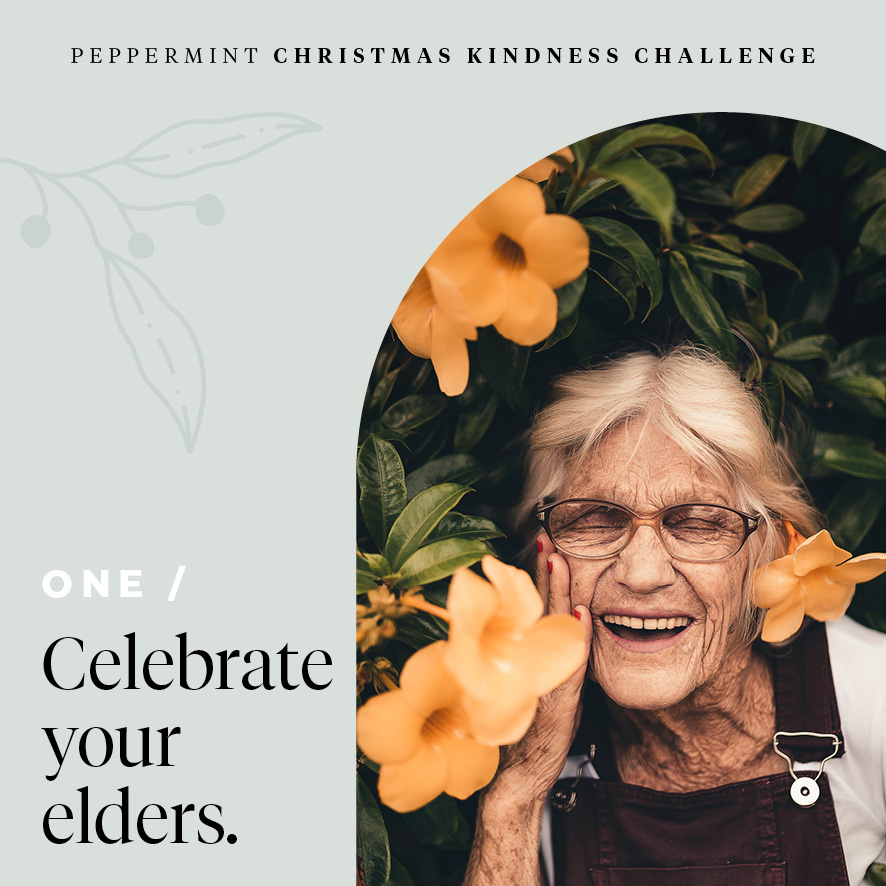
ONE / Celebrate Your Elders
With COVID-19 safety dominating our movements in 2020, there is no arguing that the wisest members of our community have had it tough. Keeping them safe has required us to keep our distance, which has translated into loneliness and isolation for some. This holiday season, take some time out to consider your elders. Whether you’re in contact with relatives or yours have sadly passed, here are some tips on how you can mindfully make this holiday season a special one for them without compromising safety guidelines:
Make a photo book for the grandparents so they can relive the year with you. If craft is your thing, you can make a scrapbook (bonus points for getting the kids to help). Keen to save paper? Make a digital album and FaceTime them to explain how to operate it.
Cook a special meal or treat and have a portion of it delivered to them with a note to let them know you will be in contact. Give them a call (video would be great) and have them share the meal with you. Or maybe just drop off a fruit basket or some home-baked (or even store-bought – no judgement here) cookies to an elderly neighbour.
Got some spare time? Contact a local nursing home or aged care facility and enquire about what you can do to assist them in making the holiday season memorable for their residents.
Want to learn from those who have life experience? Why not reach out to someone in your local area and ask if you can be pen-pals? This could mean physical letters or a phone call. If you’re too shy for this why not start by reading a memoir (we like Born-Again Blakfella by Jack Charles) until you feel confident asking someone.
Take walks around your neighbourhood and be mindful of the places where older people live. Consider how you can assist these people over the holidays. It might mean offering to mow their lawn for them, dropping a letter in their mailbox with your details in case of an emergency or suggesting that you pick up some extra provisions at the farmers’ markets to drop off for them at their door contact-free. Ask your kids to help you come up with creative ideas.
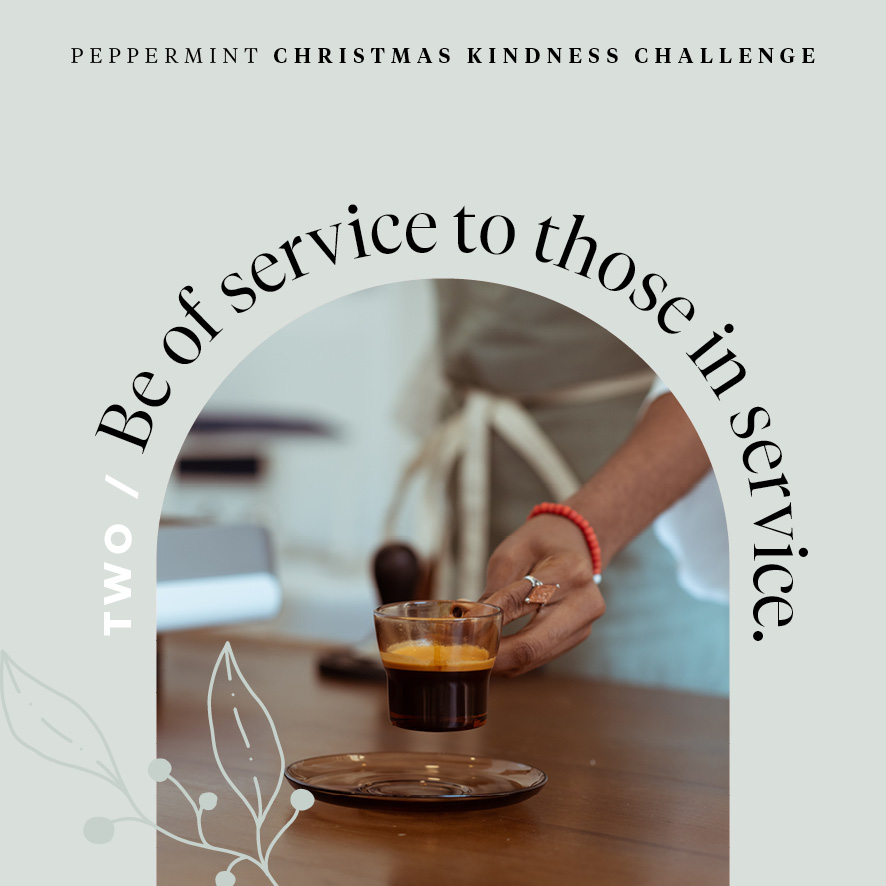
TWO / Be Of Service To Those In Service
Anyone who has worked in the service industry will know that price checking a tag-less item with an ever-growing line of angry customers frowning at you (tapping their feet and glaring at their watches), while ‘It’s The Most Wonderful Time Of The Year’ plays on a loop in the background, is enough to warrant a throbbing forehead vein, anxiety spiral or both!
Being of service over the holiday period lets you see the very best and worst of our consumer society. So next time you’re in the stores buying food, goods or services, why not mindfully consider the service staff’s experience (who work extra-long and hard hours over this time to help make your Christmas merry). Here are some tips on how you can be kind to those who are at the frontlines of retail and hospitality:
Next time you’re in a store and see things that aren’t where they should be, take a small moment to put them back in their right place. Picking up a few clothing items that have fallen on the ground won’t take up much of your time, but it may save the store staff hours of clean up at the end of a long shift.
Whether you’re at a major retailer or the farmers’ markets, be kind to the person who is serving you. One of the kindest things you can share with them is an expression of gratitude for the hard work they have put in over the holiday period. Be sure to do this face-to-face and ask for the person’s name. Then, head to the store’s website or social media and submit a written testimonial of the pleasant experience you have had. Many stores offer employee incentives for written testimonials from customers.
Participate in a random act of kindness by offering someone a little something special. Most stores won’t accept cash tips (some restaurants will), so consider sharing vouchers for a foot massage (perfect for a split shift pamper session or the morning after midnight trade) or a free coffee or lunch at a nearby café.
As pesky as the sales-pitch can be, try to be kind to those telling you about the in-store promotions (even with the glaringly obvious signage). Many stores enforce sales scripts and mystery-shop to make sure staff are following them. If you dislike the approach, be sure to direct constructive feedback to the store’s head office, not the sales staff. That way appropriate changes can be made to sales scripts by the management teams that write them.
Ask staff for their advice. They are there to help you find the perfect gift for your aunt, and they know what the tastiest vegan option on the menu is. If you engage with them as you would a friend, you will get kind and helpful service in return and tick off the shopping list speedily.
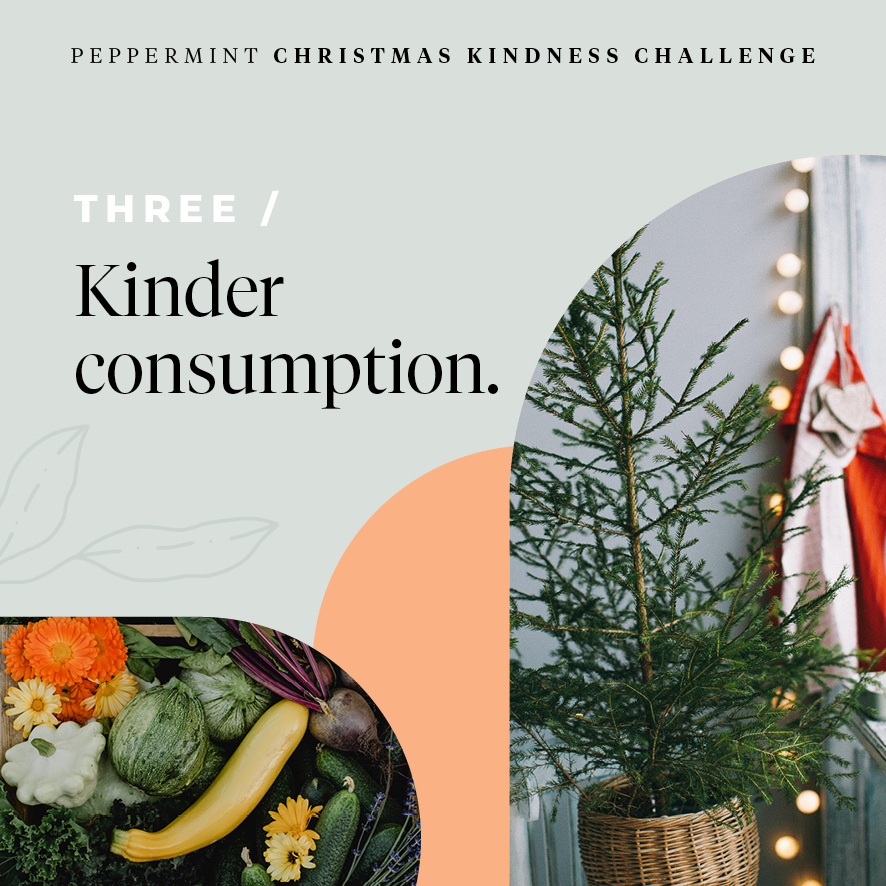
THREE / Kinder Consumption
The holiday season is one of the biggest shopping events of the year. A time when we see sale figures and our waste outputs skyrocket, and we collectively tend to spend on novelty or seasonal items such as plastic trees, synthetic Santa hats or single-use plastic stocking stuffers. We know our Peppermint family are already mindful consumers who may have their own low-waste holiday plans in place. So today’s kinder consumption post has been made for those who care to share. Here are some simple tips on consuming mindfully this holiday season that you can share with your wider circle:
When shopping for holiday decorations, please take a moment to reflect on the finite nature of our planet. There is no magical ‘away’ we can send our unwanted goodies. Next time you are in line to purchase, think: “1) Do I need it? 2) Is it biodegradable? 3) Can I make it myself? 4) Will I use it more than once? and 5) Will it end up in the landfill?” Considering these points before tapping your card can help you make purchasing decisions that are kinder to the planet.
Think second-hand first. Holidays are an expensive time of the year, and we often overlook second-hand options during the silly season due to time pressures. If you haven’t stepped foot in a charity store over the last couple of months, it might be surprising to know that many of them have Christmas shops stocked with all your second-hand decorating needs. Choosing to buy your Christmas tree and tinsel from these places will help keep these items out of landfill, support charity and keep your costs down. Keep a lookout as some charity stores even offer eco-friendly cleaning products and biodegradable bamboo or paper plates.
If you’ve struggled to get to the farmers’ markets over 2020, do some research on local food delivery services. Many companies offer farm-to-door delivery services and some of your farmers’ market favourites have adopted similar strategies to ensure that produce finds you during lockdowns. Choosing local produce means a fresh, tasty, and low-carbon-mile holiday feast.
For some (especially those who have the love language of gift-giving), the holiday season means presents! These holidays consider how you can incorporate the gift of experiences instead of things. It’s kinder for the planet! If you choose to gift tangible items, ask the recipient what they need and choose to shop from sustainable or ethical brands first. If the items on their Christmas list can’t be purchased from brands with eco-credentials, check places like eBay, Depop, Gumtree, and Facebook Marketplace for second-hand options. Due to many stores’ strict returns policies, you will often find the exact item you are looking for being sold in as-new condition as the seller has selected the wrong size or item and can’t return it.
Less is often more during the holiday season. By less, we mean less waste, meaningless stuff, unnecessary commuting and stress. Think about how you can take the ‘less is more’ approach these holidays by communicating with those around you to find out what really matters. Do your kids care about the plastic Christmas tree, or would they be just as happy decorating one of your houseplants in homemade popcorn garlands? Would the family be willing to bring their own share plate of food to dinner to save on the cooking efforts? Could they take their leftovers home for Boxing Day lunch consumption? Ask the family if they want lots of little gifts or if they prefer to pool money and use it to buy one meaningful gift each or a collective gift such as a holiday or experience.
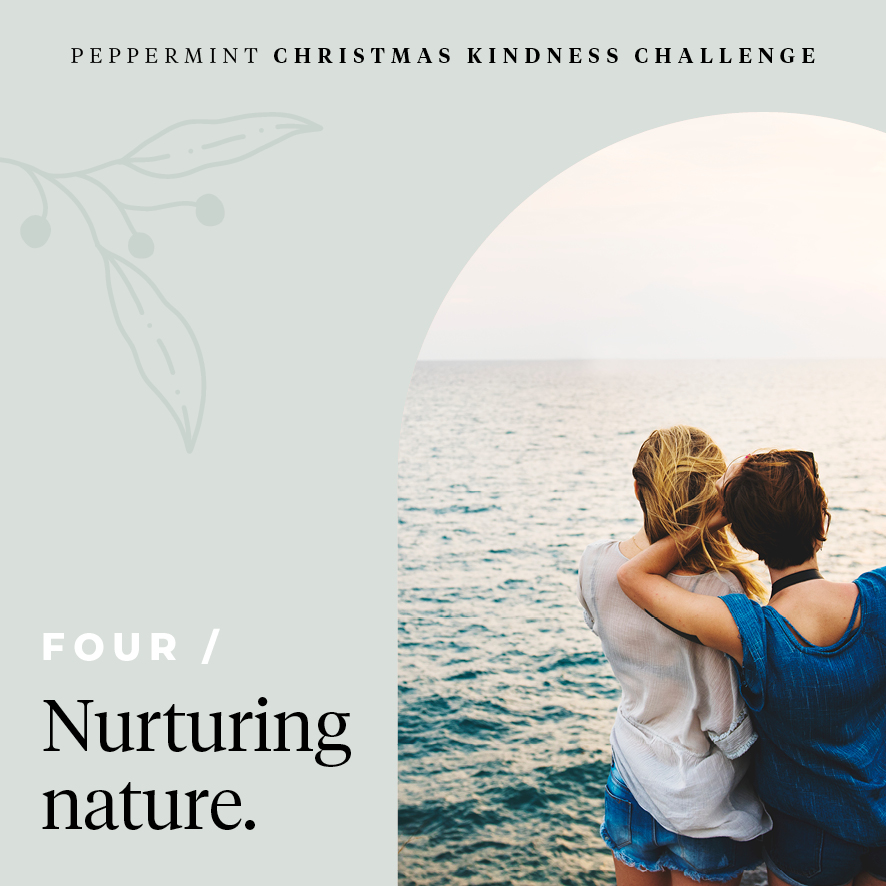
FOUR / Nurturing nature
When we think of the end-of-year holiday season, it conjures up images of food with family, presents, religious gatherings, bearded men with jolly laughs, seasonal lighting and end-of-year holiday parties. Many of us may take time off over the holiday break to spend time in nature, but if thoughts of the world around us don’t immediately spring to mind when you hear ‘Christmas’, you aren’t alone. So why not take a time-out from the busy holiday planning schedule to reconnect with the natural world in a caring way. Here are some tips on how you can make a difference this holiday season:
Next time you are meeting for a holiday celebration, why not suggest an outdoor gathering. Not only do outdoor catch-ups mean safer COVID spacing, but they also offer an opportunity for fresh air, adventure, and world-saving activities. Meet at a nearby park or beach and make a game out of collecting litter (don’t forget your gloves and to wash your hands), offering rewards for the one who collects the most. Challenge your friends or co-workers to a zero-waste picnic, where each person brings their own plate of food and reusable or biodegradable crockery and cutlery.
If you have time off over the holiday period, search for activities in your local area that give back to the planet. Whether it’s a citizen science turtle care program, planting trees for revegetation or being part of the community garden group, there are many ways to give back (and perhaps learn something in the process).
Whether you’re a city dweller or living off the grid in the great wilds, insects are everywhere and often underappreciated. These little critters do so much for us, and it’s about time we gave them some kudos. On your lunch break, spend some time observing the little things in your area. You might want to google and learn more about the insects you spy, find out what they do for our ecosystems and how chemicals used in production can impact them and our wider world.
Find a place where you can be alone in nature. You don’t have to travel far. It might just be a nearby park. Switch off your devices and spend some time listening to the sound of the wind in the trees, notice the sparkle of the sunlight on the surface of the water and inhale the fragrance of the dry bark on the forest floor. Use this mindful moment to reinvigorate your motivation for preserving nature for both the benefits we receive from it and nature for nature’s sake.
Use a prompt (a good one might be each time you hear a Christmas Carol play) to learn about an environmental issue that you care about. Pick a topic (increasing frequency in extreme weather events, environmental racism, permafrost melt, carbon sequestrations) and find out details about it, what it means for the whole-of-planet and what you can do as an individual. Start incorporating small changes each day.

FIVE / For the love of non-humans
Holidays aren’t just for people. For many of us, the family extends beyond humankind to include animals that share our homes and neighbourhoods. This silly season, let’s take a look at how you can extend your human-kindness to be inclusive of the non-humans that cohabit with us:
Holiday gifting of pets as presents sees shelters inundated with unwanted domestic animals. While the gift of an adopted shelter pet may be one of the very best presents a person (or family) can receive, all parties must carefully consider the long-term commitment that is required to give the love, care, and attention the animal deserves over the course of its whole lifetime. If anyone is unsure that they can commit the time, money and lifestyle changes required, opt-out of pet ownership and consider donating time or money to animal-related charities instead.
Domestic pets can have detrimental impacts on local wildlife if left unattended. Be kind to native species (many of which are under severe threat from land clearing, the 2020 fire season and disease) by being a responsible pet owner. If you’re headed on holidays, get a pet sitter who can make sure your animals are kept inside at night or take them to a boarding facility. If holidaying with pets, follow signage. Many places restrict or ban pet movement due to fragile ecosystems (like turtle nesting) or because the presence or scent of domestic animals can be a barrier to native animal movement.
Rethink animal products this Christmas by selecting plant-based or ethically produced options where possible. Whether you’re a strict vegan or just wishing to reduce your carbon footprint, switch things up this season by opting to add some plant-based items to your menu or by choosing to purchase local animal products from ethical and organic sources. You may be surprised by how many plant-based or local items you can add to your Christmas menu with just a little bit of research.
Use your downtime to learn about human impacts on non-human species and their habitats. Whether you’re interested in ethical production of food and clothing or saving endangered species, there’s lots of resources available on paid and free streaming sources like Netflix, ABC iview, and SBS On Demand. Our recent must-watches include Reef Live, Extinction With David Attenborough, and My Octopus Teacher.
Search for citizen science activities in your local area that enable you to connect with and better understand and care for the local wildlife. You can take part in monitoring Australia’s bird species populations, help map reef health or use app-based technology to contribute to the Atlas of Living Australia.
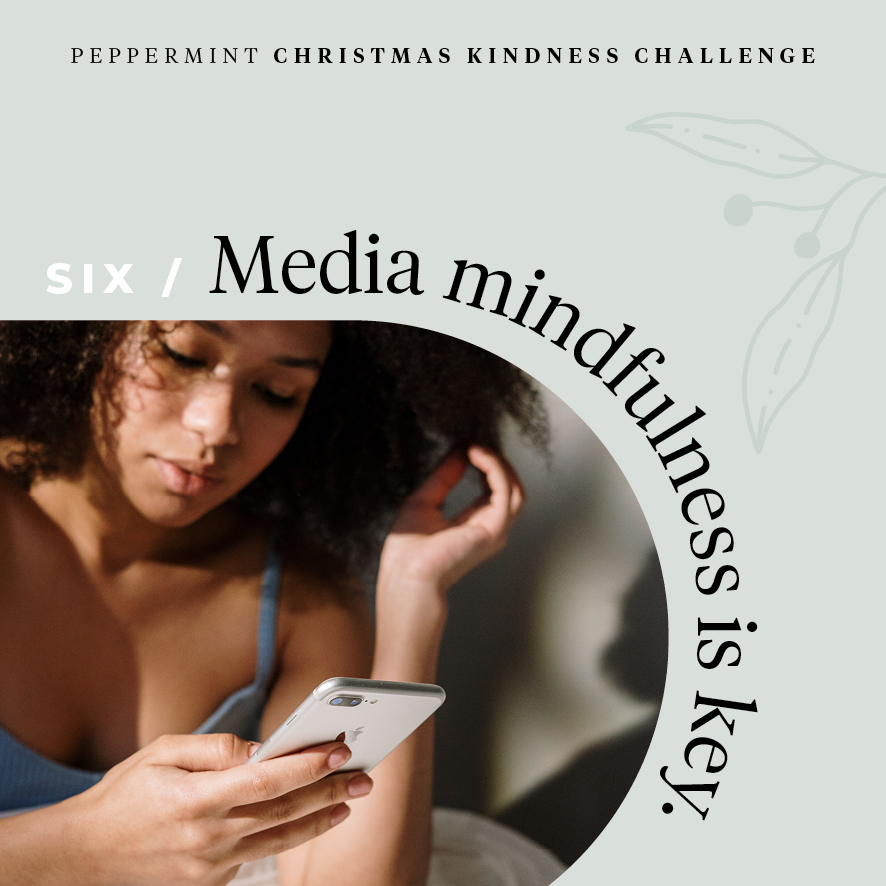
SIX / Media Mindfulness Is Key
If you’ve been online recently (and given you’re reading this post, we assume you have), you might have noticed that we are living in divisive times. Many of the methods we use for communication are built on persuasive technology and algorithms that aim for binary outcomes (yes/no, like/dislike, right/wrong) and fill our feeds with bias confirming content suggestions. As we are bombarded with click-bait style headlines designed to get our fight-flight-freeze receptors flaring, let’s look at how we can be more mindful in our media consumption and kind in our online communications this holiday season:
This year has resulted in a call out for inclusivity in our media channels. From racially biased computer algorithms, to the global call-to-arms to increase the reach of voices from marginalised groups, 2020 is the year for expanding your awareness. Take some time this holiday season to understand what an ‘echo-chamber’ is. Then actively use some of your holiday break to find news channels and sources that allow you to step away from the media that confirms your personal biases and learn more about other people’s lived experiences and differing points of view. Choose to empathetically understand the background of another’s lived experience and point of view before making comments in real life or online.
Consider using online resources to uncover gifts that benefit marginalised makers or communities. You may find gifts that use indigenous artisan techniques at risk of being lost due to colonisation or globalisation. Your online searches might also see you giving gifts that encourage the expansion of thought to marginalised individuals and communities (we love the book Me And White Supremacy by Layla Saad). By doing this research online, you change your algorithm patterns. This means you’ll start to see a broader range of content from marginalised voices and, if you like and share this content, you help give them greater visibility.
If your holiday commute includes plenty of travel, use this time to expand your awareness with podcasts. Turning idle travel time into a space for learning and expansion can introduce you to various voices that may not have made it to your regular media suggestions. You might like to tune your ears to iWeigh for radical inclusivity, Freakonomics to better understand our human consumption patterns (including insights into how persuasive technology works) and NPR’s Code Switch for an insight into the lived experience of people of colour.
Stop for a moment to consider your holiday table. If you were to look around, how many of your guests would be on their devices? Consider implementing a tech ban for part of the holiday season (it might be best to bring this up after a family viewing of The Social Dilemma) and commit that time to an activity that encourages bonding and togetherness. A trip to the beach, a hike in nature, or planting a food garden would all be memorable alternatives to screen time.
In the lead up to Boxing Day sales start a spam audit. Each day assess your email inbox and think: “1) Do these messages benefit me? 2) Will I miss important information if I unsubscribe from this email list? and 3) Does this email list result in me buying things I don’t want or need?” Choosing to opt-out of email lists or restrict time on social media can help reduce the desire to buy things you don’t really need, which is beneficial for you, your wallet, and the planet!
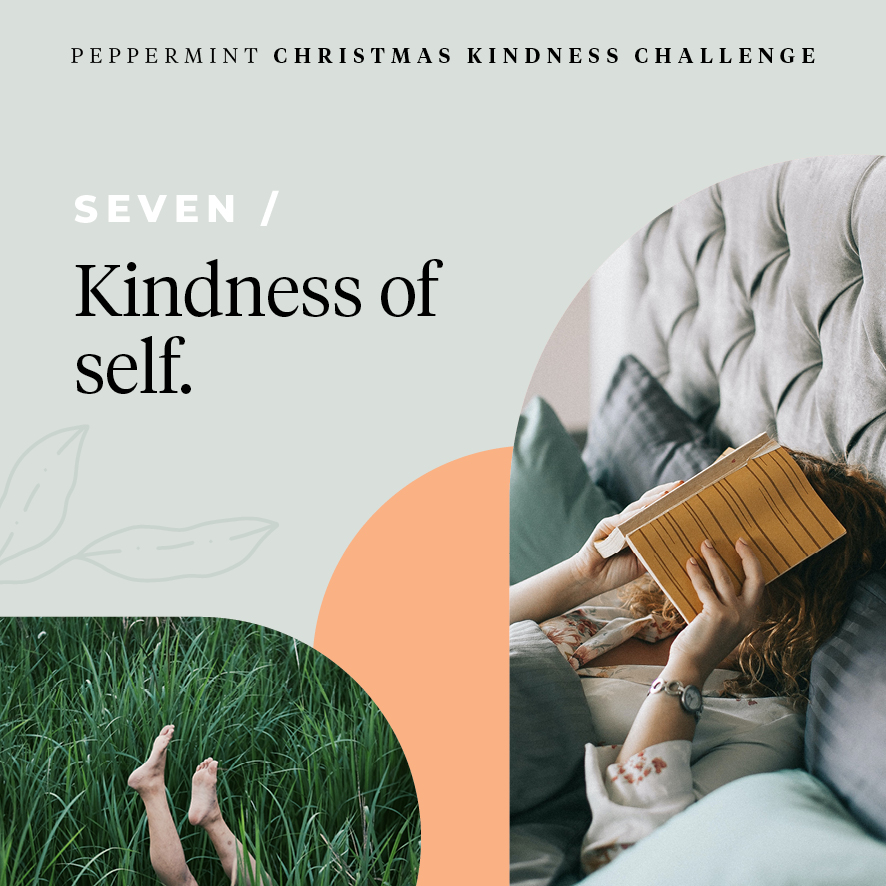
SEVEN / Kindness Of Self
During the busy season, the food is abundant and the drinks are flowing as we race from one event to the next. It can be easy to let self-care and looking after your own mental health slip to the bottom of the to-do list. Throw school holidays into the mix and pausing for a quiet moment of meditation, crafting or stretching your legs in nature can seem impossible! Consider this prompt an open invite to take time out to nourish yourself so you can continue to do good things during these busy times. The following suggestions are created with the challenges of self-care during the school holiday break in mind:
Try to carve out a time on your calendar for exercise you enjoy. Whether it’s a walk in nature, yoga, swimming or cycling, making time for this type of self-care is essential for physical and mental health. If you’re struggling to make time in the holiday schedule, think creatively. Can you choose to use public transport instead of driving to work? Squeeze in 30 minutes of walking each day to and from the bus stop. Rather than idling in the car park for twenty minutes trying to find a nearby space, why not park in the distant car parks and walk into the store? Kids have you busy over the holidays so you can’t get to the gym? Choose to entertain them in low-emission, high-physical exertion activities you can join in, such as trampolining, ropes courses or inflatable water parks (instead of theme parks).
Find some natural skin and hair care recipes you can make at home using your kitchen or garden contents. Get the kids involved and have a guilt-free family spa day at home.
Spend some time with a good book. Books are a gateway to escapism, self-discovery and knowledge, and they don’t have to cost the earth. Check out your local library, request books as gifts, e-read, or listen to an audiobook (which can be a reading saviour for busy parents).
The kids are arguing, the dog is barking or perhaps you’re in the lunch-rush queue at the post office and there’s someone at the front of the line paying for all their Christmas postage in five cent pieces. You might not be able to make time for extensive self-care at this very moment, but you can use this less-than-ideal time for grounding breath practices when you feel overwhelmed. Start by noticing the feeling of your feet on the ground. Allow yourself to feel supported by the earth and bring the awareness from the ground up to your chest and breath. Take a deep breath in through the nose, inflating the belly. Hold the breath for a moment. Then breathe out slowly through the nose visualising tension leaving your body. Repeat as often as needed. It won’t solve all your problems, but it will help you reset your mindset before acting (which often increases kindness and empathy).
Kiss comparison goodbye and embrace yourself, perceived flaws and all. Stop comparing your lived experience to others around you. We are all walking our own paths, fighting our own battles and celebrating our own successes. Despite what cancel culture will have you believe, we all make mistakes and they are an essential part of learning and community dialogue. Know you can and will make mistakes (and that it’s totally OK to do so). Know your worth is not dictated by the way you look, your career or your bank account. Like every other being on this planet, you are so worthy, loved and essential to the intricate fabric of our collective lived experience.
If there is one thing to take away from the year 2020, it is the importance of connection and communication. Take the time this holiday season to reach out to those around you and acknowledge their worth. Rise by lifting others.
Go forth with love and kindness this holiday season, our glorious Peppermint family. We see you, we acknowledge you and we could not do what we do without your support.

